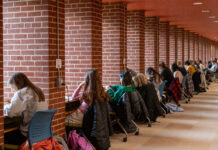A major concern worldwide is the dramatic shake-up of domestic abuse that many are enduring, and is a distress that is garnering more and more attention each and every day.
In order to raise awareness and to help reach out to people affected by this topic, a worldwide event One Billion Rising was held on Valentine’s Day. It was meant to speak out and plead an end to this crucial problem according to One Billion Rising’s website.
This Valentine’s Day was the 15-year anniversary, and the holiday is the main reason One Billion Rising was prominent around the world, according to graduate student Carly Masiroff.
At SRU, One Billion Rising was held in the Quad to honor women affected by domestic abuse, because one in three women on this planet will be raped or beaten in her lifetime, according to statistics listed on One Billion Rising’s website.
“I think it’s an important cause and I’m a big advocate on women’s rights,” senior undergraduate political science and philosophy major Nicole Geyer said. Geyer, 21, was among several different speakers who spoke to those who gathered for the event.
“I believe treatment of women around the world should be known,” Geyer added.
The history of One Billion Rising started on Valentine’s Day of 1998, when Eve Ensler and a group of campaigners went to New York City to establish a movement against domestic abuse called V-Day. It turned out to be a sold-out benefit performance at the Hammerstein Ballroom and ended up raising $250,000 in just one evening. Dancing is strived through this event, as it provides a purpose and demonstrates energy that brings everyone together, according to V-Day’s website.
“V-Day’s mission is to reclaim Valentine’s Day as empowerment and show it is not all about the good relationships, but to [also provide] support for the bad relationships,” Masiroff said.
Geyer led the event on campus by giving background information about One Billion Rising and she also shared upcoming events that correlate to V-Day. Her main focus was to bring awareness.
“I hope to have brought attentiveness to Slippery Rock
by informing students and faculty about the importance of this issue and make sure people realize this is a serious [problem],” Geyer said.
For SRU students who struggle with such issues, the Women’s Center on campus is running many programs and is one of many places available to assist individuals through this hardship.
Director of the Women’s Center Jodiann Solito is aware of this situation – particularly on the SRU campus – and deals with many students on campus that are abused. According to Solito, her main focus is to educate and alert others that the matter of domestic abuse is a reality.
Solito said many college students, typically women, experience abuse in a relationship, from someone they just met or from a former partner.
But according to Solito, there is a 40 percent rate of high school students involved in an abusive situation.
“My goal is to educate men to not treat women as objects, but to realize they are people and have values and to also let them know women are not a property,” Solito said.
Not all women are, in fact, the ones being abused. Men are also very likely to be in this situation, although men are less likely to confront the subject as to women who will face the issue, according to Solito.
According to the Sexual Violence, Domestic/Dating Violence and Stalking stats for 2010-2012, 82 students, faculty or staff members received services from the Bridge Project Advocate. That averages out to 27 individuals per year.
“When someone has been in this situation, they normally come to the Women’s Center on campus and the information will be reported to VOICE, which is the Victim Outreach Intervention Center located in Butler,” Masiroff said.
There are several different forms of abuse that affect people, including physical, sexual, financial, verbal and mental. All this can lead to isolation from friends and family that is caused by their controller. It makes the person powerless, have trust issues and can impact a future relationship, according to Solito.
According to the Campus Dating Violence Fact Sheet, many victims remain in the abusive relationship because of fear, self-blame, loyalty and love for the person or threats against their family and friends.
“If you are in this situation, get help,” Solito said. “Try and figure out how to keep safe and recognize signs ahead of time. And for someone who is a friend or family member to a victim, say exactly what you observe. Never tell the victim to leave the person but rather show your concern.”






